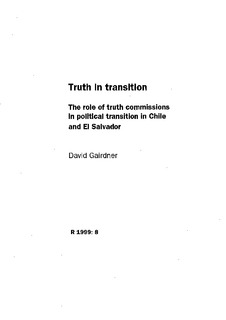Truth in transition. The role of truth commissions in political transition in Chile and El Salvador
Research report
Permanent lenke
http://hdl.handle.net/11250/2435978Utgivelsesdato
1999Metadata
Vis full innførselSamlinger
- Bora-import [434]
Sammendrag
Truth Commissions are increasingly being used as one mechanism in a broader strategy to consolidate democratic governance following a period of authoritarian rule.However, there has been little research on the impact ofCommissions, including identifying the aspects of a transition process that they are able to address. Accordingly, this study offers a framework for understanding the role of Truth Commissions in political transition. It argues that Commissions have the potential to support the consolidation of a democratic polity when they contribute towards two essential tasks. First, Commissions must act to dismantle enclaves of authoritarian power that were transplanted from the past into the post-transition polity. The presence of these enclaves undermines the democratic qualities of the new polity and renders the transition process incomplete. Second, Commissions must simultaneously help to create new structures and values on which democratic governance can be built. The interaction between the Commissions and authoritarian enclaves takes place in specific sites of transition in a given society; Strategic Behaviour (the institutional matrix of constraints and opportunities that shape interaction between social actors), Social Epistemes (bodies of knowledge and ways of imagining relations within a political collective) and the Material Environment (economic structures). Enclaves not falling within the mandate of a Commission must be the subject of action from other initiatives.
David Gairdner currently works with the International Centre for Human Rights and Democratic Development, an autonomous research institute of the Canadian State, as Manager of the Fund for Public Policy Development in Guatemala. Mr. Gairdner has previously worked in Mexico, Colombia and the Dominican Republic, and has contributed to CMI publications on three occasions. He is a graduate of the Masters programme of York University, Department of Political Science.
Utgiver
Chr. Michelsen InstituteSerie
Research reportR 1999: 8
